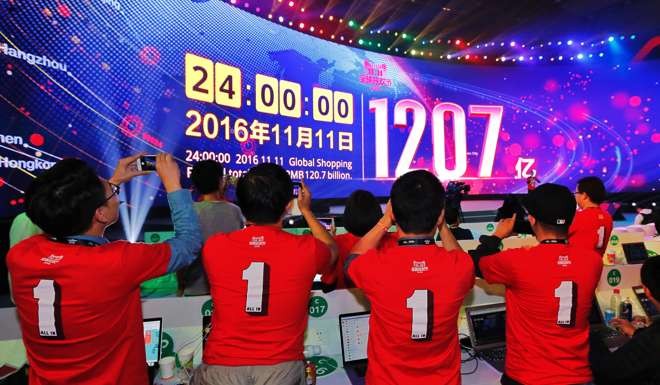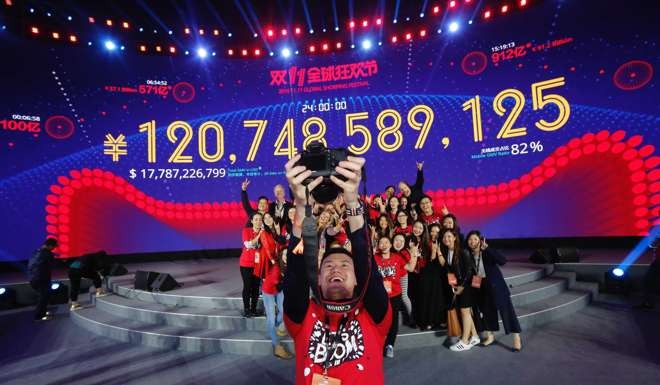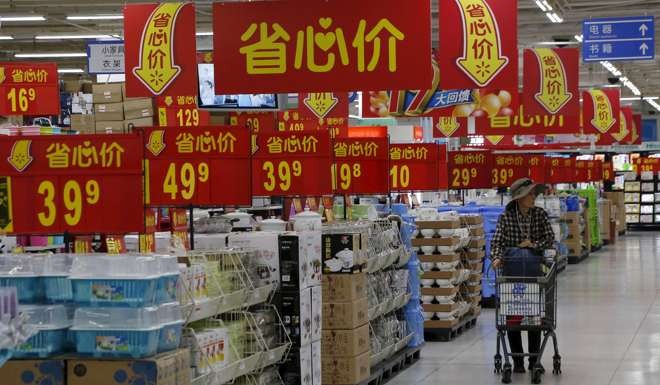
Analysis | FMCGs dominate Singles’ Day and wider online shopping arena
Uniqlo, Midea, Honor and furniture maker Linsy among most popular sellers with sales each surpassing 100 million yuan within the first half hour of shopping event
Fast moving consumer goods (FMCG) were among the most chased-after goods during Alibaba Group’s Singles’ Day online shopping extravaganza over the weekend, which highlights young Chinese consumers’ preference for convenience in buying daily necessities.
Cosmetics, books, baby goods, electronics, pharmaceutical products, fresh produce, clothing and mobile phones all recorded huge sales during this year’s event, according to data released by Alibaba, whose main shopping platforms are Taobao Marketplace, TMall, and AliExpress.
But in terms of the top individual brands, a broad representation from various categories of retailers stole the show.
Japanese clothing brand Uniqlo, home appliance major Midea, mobile handsets brand Honor and Guangdong-based furniture maker Linsy were among the most popular sellers with sales each surpassing 100 million yuan within the first half hour of the shopping event.
FMCG spans everything from infant formula to soft drinks and beauty products, and China’s annual online spending volume last year shot up to US$25.3 billion from US$1.4 billion in 2010, according to market researcher Euromonitor International.
As Chinese urban dwellers rely more on e-commerce for their daily necessities to save time and money, online sales of packaged foods, alcoholic drinks and personal care products are expected to record exponential growth in the years to come, a recent survey by London-based consultancy OC&C found.

The report showed while large grocery sales in China still have lower online penetration than the other categories, as well as tech-savvy millennials, those aged between 30 and 50 said they would be opting to buy daily necessities online in the coming six months.
“The growing middle classes want to save money on everyday consumables so they can use these savings towards a better lifestyle including for dining out or buying international fashion brands,” said Jack Chuang, Partner, Greater China, OC&C Strategy Consultant.
“As their appetite for premium and healthy products rises, consumers are also seeking to order imported foods and drinks online if they can’t find them in local hypermarkets or corner stores.
That has prompted Alibaba to put Borges olive cooking oil from Spain, Ocean Spray raisins from US, and Haribo gummy candy from Germany – essentially the Western snacks barely seen across Chinese urban neighbourhoods – on sale in its online supermarket.
“Chinese consumers are eager to try something new, and they always favour brands they consider more reliable,” said Joerg Wolle, CEO of Swiss market expansion giant DKSH Holding which recently purchased a major stake in eSweets, a Shanghai-based distributor of high-end consumer goods such as Lindt chocolate and Illy Coffee.
The grocery market space, from soy sauce to shampoo, is becoming an emerging billion dollar battleground for Chinese e-commerce giants Alibaba and its chief rival JD.com as they hunt for new revenue growth in China.
The war is likely to be costly and any victory will be hard fought, with rock bottom prices no longer the only key to success in e-commerce.
Rather, it will be the quality of goods that entice China’s rising middle classes who are thirsty for Fiji water and hungry for European biscuits.
It will also bring about change to the shopping habits of millions of Chinese, most of whom are accustomed to ordering clothes and home electronics online, but would still walk to a convenience store or supermarket for their daily necessities.
The war escalated in the three weeks leading up to Alibaba’s November 11 Singles’ Day online shopping extravaganza when Wal-Mart Stores joined with JD.com to set up a Beijing online store to deliver imported goods to Chinese shoppers “within hours”.
On the same day in Hong Kong, Alibaba spotlighted its alliance with giant US warehouse retailer Costco Wholesale, and other grocery brands like Procter & Gamble, as part of its Singles’ Day promotions that included coupons, discounts and offering products not yet available in China.

The pacts with Western consumer multinationals were part of a multibillion dollar campaign rolled out by Alibaba, owner of the South China Morning Post, as it vowed to outspend its rivals to gain an upper hand in the unfolding grocery war.
“While [JD.com] is talking about US$1 billion investments, we are willing to invest multi-times that number because this is a category we think we should be in as it has great potential,” Alibaba’s chief financial officer Maggie Wu said in a call with analysts in August.
In the second quarter earnings result, Alibaba singled out its Tmall online supermarket as a business that scored a stellar “triple digit sales volume growth”.
JD’s grocery revenue soared 70 per cent over the first quarter of the year, while Alibaba’s online supermarket, currently the largest nationwide, more than tripled its sales for the same period.
“Without question, fast-moving consumer goods are where Alibaba and JD.com’s future growth lies, with home appliances and clothing e-commerce in China approaching saturation,”said Hu Chuncai, Shanghai-based general manager with retail management consultancy Shangyi Consulting.
A price war between the two titans have also erupted, and intensified.
In early September, Alibaba’s Tmall Supermarket spent an estimated 180 million yuan on offering 50 per cent discounts in time sensitive deals in Beijing and Shanghai, firing back at similar sales promotions at the grocery division of JD.com, with the Beijing-based e-commerce firm promising to make its online grocery store “second to none” within three years.
“But the chance is slim for JD to live up to that pledge, given that Alibaba has already gained a position of dominance particularly in southwest and northwest China,” said Shangyi Consulting’s Hu.
The OC&C survey of 4,600 Chinese urbanites found that Alibaba’s Tmall and sister e-commerce site Taobao achieved the highest brand awareness and shopper penetration across major grocery categories, from infant formula to alcoholics drinks.

But China’s online grocery market is also more fragmented, as Alibaba commands a 52 per cent market share versus a 70 per cent it controls of the overall online retail landscape in the country, according to OC&C.
Alibaba’s chief executive Zhang Yong noted in a recent interview that winning consumers and success in China’s online grocery market also called for a “full embracing of offline channels”.
“A partnership with bricks-and-mortar retailers will allow shoppers to place orders online and collect items in person at a store nearby, which will serve as part of the grocery delivery network,”said Hu,
Driving down logistics costs would considerably fatten profit margins of grocery e-commerce, where package shipping can be more “costly” compared with bigger ticket items such as apparel and home appliances.
While JD tries to utilise Wal Mart’s extensive distribution channels across cities as it reinforces its cooperation with the US supermarket giant, Alibaba’s logistics affiliate Cainiao managed to reduce shopping time by launching grocery delivery centres across China’s most populous cities.
In June, Alibaba invested 5 billion yuan in a partnership with white goods retailer Suning Commerce Group, linking its online shopping platforms to the latter’s over 1,600 outlets 5,500 after-sales service points in China.
Although e-commerce powerhouses are now making an all-out effort to make online purchases of toothpastes and potato chips easier than ever, patience is needed for Chinese consumers to really overhaul their grocery shopping patterns, experts reckon.
“It will take time, probably a few years,”said OC&C’s Chuang, “and the shift will be on a gradual basis.”
Additional reporting by Eric Ng

